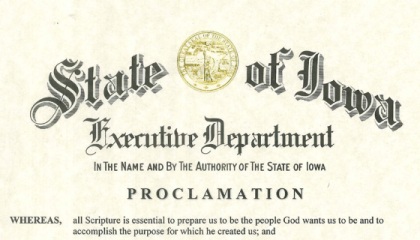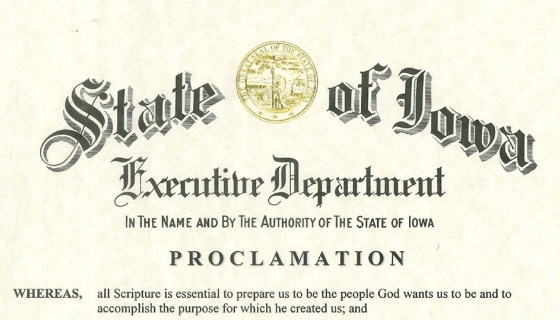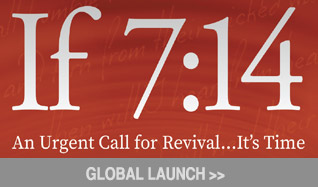 Iowa Governor Terry Branstad is under fire over a recent proclamation encouraging Iowans to read the Bible. Some are calling Branstad’s action unconstitutional. But is it really?
Iowa Governor Terry Branstad is under fire over a recent proclamation encouraging Iowans to read the Bible. Some are calling Branstad’s action unconstitutional. But is it really?
The FAMiLY LEADER’s Greg Baker and Nathan Oppman dive into the history books to answer the question. Greg provides an overview of the controversy, while Nathan’s research below provides links to citable historical evidence:
From Greg Baker
In April Gov. Terry Branstad issued a proclamation encouraging Iowans to participate in a 99-county Bible reading marathon that is being organized by the Iowa Prayer Caucus. From June 30-July 3, the Bible will be read in front of all of Iowa’s county court houses with encouragement from our state’s governor. He also encouraged Iowans and their families to read through the Holy Bible every year until the Lord comes.
This proclamation has now come under heavy criticism from the American Civil Liberties Union (ACLU) and the Freedom From Religion Foundation, which are considering a lawsuit against the state of Iowa, claiming that Branstad violated the separation of church and state.
But America today has twisted the phrase “the separation of church and state.” We seem to think it means that pastors cannot speak about government in the church and that the government cannot mention God. Many elected officials and pastors have accepted this not only as law, but also as the best means of practice.
The phrase and principle, however, was originally stated and applied to protect Americans and the church from a national church being founded, much like those in Europe, such as the Church of England. In America, we did not want to require everyone to attend one national church led by the government. Rather, we believed the two should be separate institutions.
Yet clearly, America’s Founders never intended “separate” to mean “mutually exclusive.” In fact, Gov. Branstad’s proclamation echoes Benjamin Franklin’s suggestion at the very Constitutional Convention itself that an appeal to God needed to be made for His intervention and that each day of the Convention must begin in prayer. Or when President Abraham Lincoln in his Second Inaugural address boldly proclaimed that God was judging America for its sins and in order for the Civil War to end, America need to repent. President Lincoln issued numerous proclamations, calling America to days of fasting, prayer, and repentance.
And from a larger perspective, if the institution of government should fail to look to God and His Word, that is when we need to get concerned. For government is God’s institution of justice to punish evil and reward good. Yet how can the government rightly determine good and evil without God and His Word?
Not only is Governor Branstad’s proclamation clearly constitutional, but we should thank him for being humble enough to look to a higher power – and not just any higher power, but our Lord Jesus Christ and His Word.
The following from Nathan Oppman
Do religious proclamations violate the Constitution?
To the contrary, historical precedent reveals Congress has often supported and promoted religious activity.
In 1774 Congress informally employed the services of the rector of Christ Church in Philadelphia, Jacob Duché, and on July 9, 1776, he was formally elected as the first Congressional chaplain.
After Duché defected, Congress elected two chaplains from different denominations: William White and George Duffield. This dual nomination demonstrated Congress’ concern that they not favor particular denominations. This practice was formally adopted in 1789 under a joint resolution after the Constitution was approved.
Throughout the Revolutionary period, Congress issued annual proclamations of fasting and thanksgiving, including encouragement to “confess and bewail our manifold sins and transgressions, and by a sincere repentance and amendment of life, appease [God’s] righteous displeasure, and through the merits and mediation of Jesus Christ, obtain his pardon and forgiveness,” indicating not only was Congress comfortable supporting religion, but they were comfortable supporting the Christian religion in particular. In some instances the proclamations were even Trinitarian in nature, mentioning God, Jesus, and the Holy Ghost. Other examples of religious congressional proclamations can be found here and here.
Since the military is another area that faces heavy scrutiny over religion and religious symbols, including in the state of Iowa, it is worth noting that during the Revolution one of the military offenses that was punishable in the code of military regulations passed by Congress was blasphemy. The code also encouraged religious service attendance.
In an issue that closely mirrors Gov. Branstad’s promotion of the Bible, Congress approved the Aitken’s Bible and recommended it to the inhabitants of the United States after War with Britain cut off America’s supply of Scriptures.
Though many of these actions occurred just prior to the adoption of the Constitution, they help us understand the mind of the men who crafted our form of national government. And following the adoption of the Constitution, the practice of the federal government to support religion generally continued.
President George Washington issued a Thanksgiving Proclamation in 1789 that encouraged the nation to confess sins and thank God for His blessings. John Adams did the same on the eve of a possible war with France in 1798.
Thomas Jefferson had qualms about issuing a national religious proclamation because he did not believe it the role of the Federal government. He did, however, issue such a call while serving, like Branstad, as a governor prior to the adoption of the Constitution.
As president, James Madison issued a proclamation regarding a Day of Prayer, making special mention that this was not coercive but should be done out of a willing and pious heart.
Moreover, in Iowa governors have long issued religious proclamations. Gov. Kirkwood in 1876 called on Iowans to observe a day of Thanksgiving and specifically referenced Christianity. Gov. Sherman again called for a day of Thanksgiving in 1881.
There are many other examples of such activity throughout our nation’s history. And while some presidents and governors did not engage in such activity, it is certainly not uncommon. Additionally, states were under less scrutiny for such activities than the federal government.
In light of this history, Gov. Branstad is well within his Constitutional rights as governor of a free state to encourage Bible reading in the state of Iowa and to issue religious proclamations generally.



